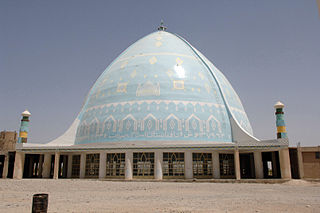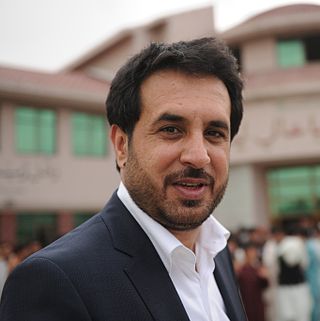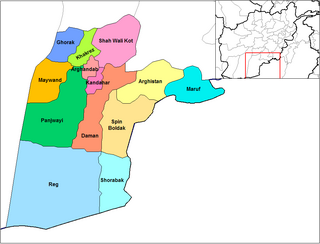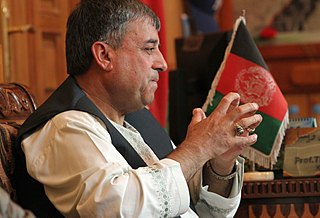Related Research Articles

Kandahar is a city in Afghanistan, located in the south of the country on the Arghandab River, at an elevation of 1,010 m (3,310 ft). It is Afghanistan's second largest city after Kabul, with a population of about 614,118. It is the capital of Kandahar Province and the centre of the larger cultural region called Loy Kandahar.

Gul Agha Sherzai, also known as Mohammad Shafiq, is a politician and former warlord in Afghanistan. He is a former governor of Nangarhar province in eastern Afghanistan. He previously served as Governor of Kandahar province, in the early 1990s and from 2001 until 2003. In October 2013, Sherzai resigned from his post as governor and formally announced himself as a candidate for Afghanistan's 2014 Presidential Election, and served as the minister of border and tribal affairs until the Taliban captured Afghanistan again in 2021.

Kandahār is one of the thirty-four provinces of Afghanistan, located in the southern part of the country, sharing a border with Pakistan, to the south. It is surrounded by Helmand in the west, Uruzgan in the north and Zabul Province in the east. Its capital is the city of Kandahar, Afghanistan's second largest city, which is located on the Arghandab River. The greater region surrounding the province is called Loy Kandahar. The Emir of Afghanistan sends orders to Kabul from Kandahar making it the de facto capital of Afghanistan, although the main government body operates in Kabul. All meetings with the Emir take place in Kandahar, meetings excluding the Emir are in Kabul.

Arghandab is a district in the central part of Kandahar Province, Afghanistan. It borders Panjwai and Khakrez districts to the west, Shah Wali Kot District to the north and east and Kandahar District to the east and south.
Canada's role in the Afghanistan War began in late 2001. Canada sent its first element of soldiers secretly in October 2001 from Joint Task Force 2, and the first contingents of regular Canadian Armed Forces (CAF) troops arrived in Afghanistan in January–February 2002. The operations were aimed at identifying and neutralizing Al-Qaeda members in that country and toppling the Taliban regime which was supporting international terrorism. Canada's role in the Afghan conflict grew in 2006 when Canadian troops relieved US forces in Kandahar province, taking command of the multinational brigade in the region during a major Taliban offensive.
Raes Abdul Wahed(also transliterated as Abdul Rais Wahid and Abdul Wahid) is an Afghan warlord.

Ahmad Shah Baba International Airport, also referred to as Kandahar International Airport, and by some military officials as Kandahar Airfield, KAF), is located in the Daman District of Kandahar Province in Afghanistan, about 9 NM southeast from the city of Kandahar. It serves as the nation's second main international airport and as one of the largest main operating bases, capable of housing up to 250 aircraft of different sizes. The current head of the airport is Maulvi Fathullah Mansour.

Asadullah Khalid is a politician in Afghanistan. He served as head of the National Directorate of Security (NDS), which is the domestic intelligence agency of Afghanistan. Before his appointment as the head of the NDS in September 2012, Khalid served as the Minister of Tribal and Border Affairs. Between 2005 and 2008, he was the Governor of Kandahar Province and prior to that as Governor of Ghazni Province (2002-2005). From 2018 until 2021 he was the Minister of Defense. Khalid is said to be affiliated with the Islamic Dawah Organisation of Afghanistan and has been noted as one of many loyalists of Afghan President Hamid Karzai.
Shahzada Akhund, known also by the title Mullah, was a Taliban militant commander who was held at Guantanamo Bay following the 2001 ouster of the Taliban regime in Afghanistan. He used a false name, Mohammed Yusif Yaqub, and pretended to be an innocent civilian.
Brigadier General Rahmatullah Safi is an Afghan former army officer, former commander of the 444th Commando Battalion under the Kingdom of Afghanistan and mujahideen commander who fought during the Soviet–Afghan War. He was later claimed to have been the representative of the Taliban movement in Europe.
The following lists events that happened during 2002 in Afghanistan.
The following lists events that happened during 2004 in Afghanistan.
The 2008 Kandahar bombing of February 17, 2008 in Kandahar, Afghanistan, was an attack targeting a crowd of people watching a dog-fighting competition. With more than 100 killed, it was the deadliest attack on Afghan soil since 2001.
The Sarposa Prison attack was a raid on the Sarposa Prison in Kandahar, Afghanistan by Taliban insurgents on June 13, 2008. One of the largest attacks by Afghan insurgents, the raid freed 400-1,000 prisoners. As of 2008, prison administration was overseen by Abdul Qabir.

The Battle of Arghandab, codenamed Operation IBRAT by the insurgents, began on June 18, 2008, when NATO-led forces attacked Taliban militants in response to Taliban attacks in Arghandab District and Kandahar in Afghanistan. The battle in Arghandab marked the second time in less than a year that the Taliban tried to take control of the area.

Mullah Naqib Alikozai, sometimes called Naqibullah, was an Afghan mujahideen commander and politician from the Kandahar area of southern Afghanistan. He was the leader of the Alikozai Pashtun tribe.

Tooryalai Wesa is a politician in Afghanistan. He was Governor of Kandahar Province from December 2008 to 2014.
Task Force Kandahar (TFK) was the formation conducting the International Security Assistance Force (ISAF) mission in Kandahar Province under ISAF Regional Command South. When it concluded its mission in summer 2011, the formation included a Canadian Forces battle group, three U.S. Army battalions, an engineer regiment, a signal squadron, Operational Mentor and Liaison Teams (OMLTs), and contributions to Operational Mentor and Advisory Teams (OMATs) and the Police Operational Mentor and Liaison Team (P-OMLT).
2003 in Afghanistan. A list of notable incidents in Afghanistan during 2003
References
- ↑ "Kandahar governor to leave post".
- ↑ "Kandahar Governor Rahmatullah Raufi fired". Archived from the original on December 5, 2008. Retrieved 2008-12-04.
- ↑ Rennine, Steve. Canadian Press, Appointment of Canadian to govern Kandahar confirmed [usurped] , December 18, 2008